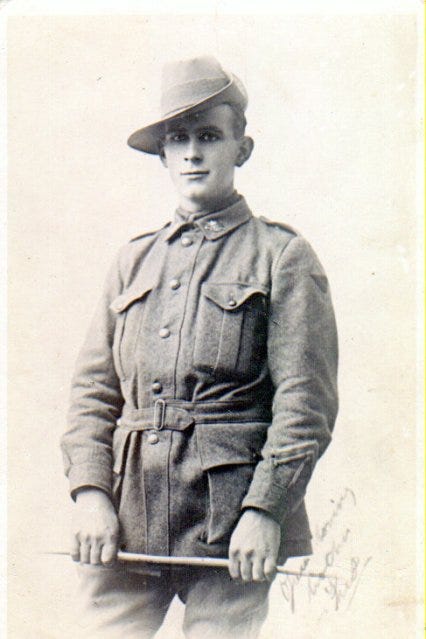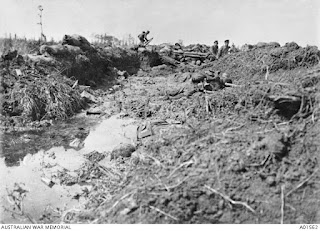Frederick Beswick Cross was my husband’s grand uncle. He was born at Homebush, Victoria on 30 July 1893, the fifth of ten children of Frederick James Cross and Ann Jane née Plowright.
Fred joined the Australian Imperial Force on 11 May 1915 at Maryborough shortly after the news of Gallipoli. He was aged 21 years 10 months and his occupation prior to enlistment was labourer. He was assigned to the 8th reinforcements of the 22nd battalion.
While on service he had various spells in hospital with enteric fever (also called typhoid fever, is an acute infectious disease characterized by high fever and intestinal inflammation, spread by contaminated food or water) and mumps.
On 25 February 1917 he was wounded in action.
In the last week of Feb. 1917 the 22nd Battalion was manning a line of outposts facing Warlencourt. The 25th of February was a difficult day for the 22nd battalion. It is not clear if Fred was wounded in the morning or evening; there were two separate engagements.
After convalescence the AIF assigned him to administrative jobs in England including with the 2nd A A Hospital, Admin headquarters and AIF Kit stores.
In February 1918 Fred Cross married an English woman, Ethel Dunkley at Our Lady of Dolours Servite Church (Roman Catholic), Fulham Road SW10 (London, England).
In July 1919 he sailed for Australia on the “Main” arriving in October. He was discharged from the AIF in November 1919 as medically unfit – disability – enucleation of left eye.
Correspondence with Ethel’s family revealed how Fred and Ethel met:
Ethel’s closest sister, Ellen, worked in a munitions factory during the war. She used to write notes to the soldiers and put them in with the ammunition. A lot of them wrote back and she had too many to deal with so she gave some to Ethel. One was from Fred. When he lost his eye (as did his brother George) he ended up in a London hospital and Ethel went to visit him. Both families objected to the marriage. After their eldest daughter Peggy was born they came back to rural Victoria. Ethel had a terrible trip out and did not always enjoy living in Australia.
Ethel came to Australia with Fred and baby Peggy in October 1919 on the “Main”.
Departed Plymouth 29 July under Captain H. W. N. Evans.
First went to live in Homebush near Ballarat on family farm but later moved to the city [Melbourne] because Ethel (a city girl) had trouble coping with life in the bush.
Fred and Ethel had three daughters. The oldest was born in England.
Fred died in 1959. Ethel died in 1971.
Links:
Wikitree: Frederick Beswick Cross (1893 - 1959)
Online research journal 5 May 2013: Frederick Beswick Cross (1893 – 1959) World War I service














